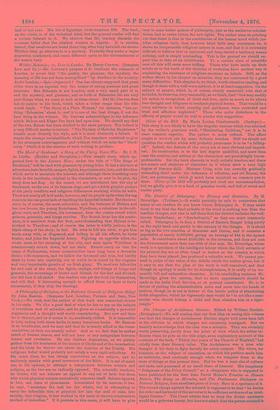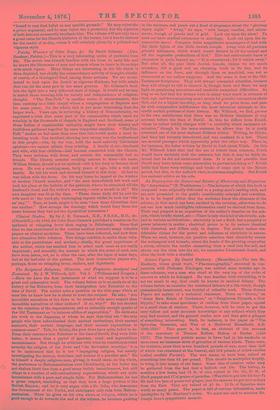The Charges of Archdeacon Sinclair. Edited by William Sinclair. (Rivingtons)—We
will confess that our first idea on seeing this volume was that the 'charges of Archdeacon Sinclair might well have been left in the oblivion to which charges are commonly consigned. But we frankly acknowledge that the idea was a mistake. They are certainly worth preserving, partly from the point of view which the editor in- dicates when he puts on the title-page, as an explanatory account of the contents of the book, "Thirty-two years of the Church of England," but chiefly from their literary value. The Archdeacon was a man who thought it his duty to fight fiercely for every outpost. His views, for instance, on the subject of education, on which his position made him an authority, read curiously enough when we compare them to the state of things at this present time. But he was a man also of culture and taste, and possessed of no small share of humour. His imaginary "Judgment of the Privy Council" on a clergyman who is supposed to have published for the first time David Hume's Treatise on Human Nature, The Essay on Miracles, and The Posthumous Dialogues on Natural Religion, is an excellent piece of irony. Here is a specimen of it The second charge against the accused is supposed to be that "he denies the order and harmony of the universe to be sufficient evidence of an intel- ligent Creator." The Court admits that to deny the divine existence would be a grievous heresy, but does not admit that the person soused is
"bound to rest that belief on any specific grounds." He may reject the a priori argument, and he may reject the a posteriori, but the rejection of both does not necessarily inculpate him. The volume will not only have a great value for the Church historian of the future, but it has its interest for the reader of to-day, whom it will certainly please by a polished and vigorous style.



































 Previous page
Previous page